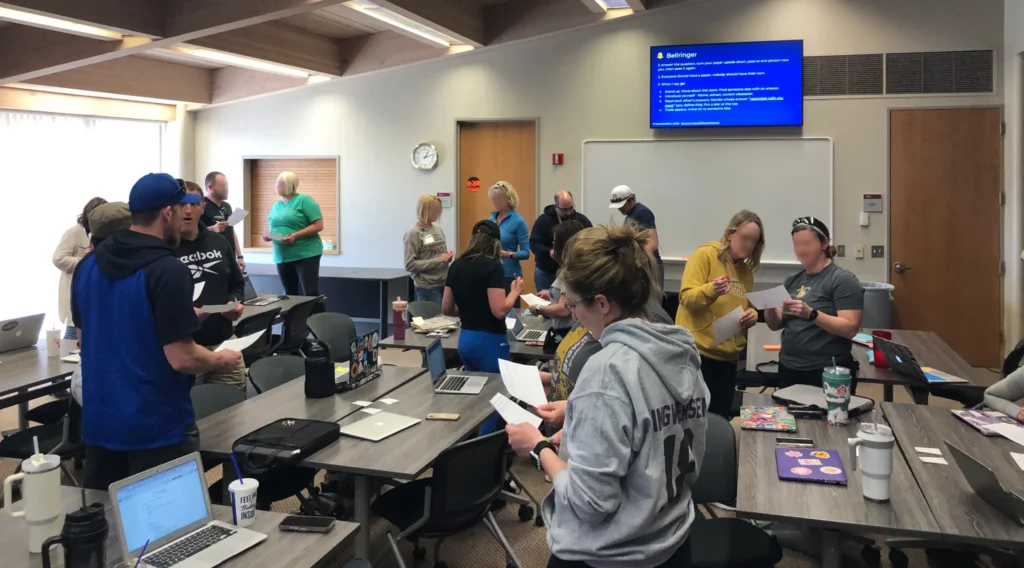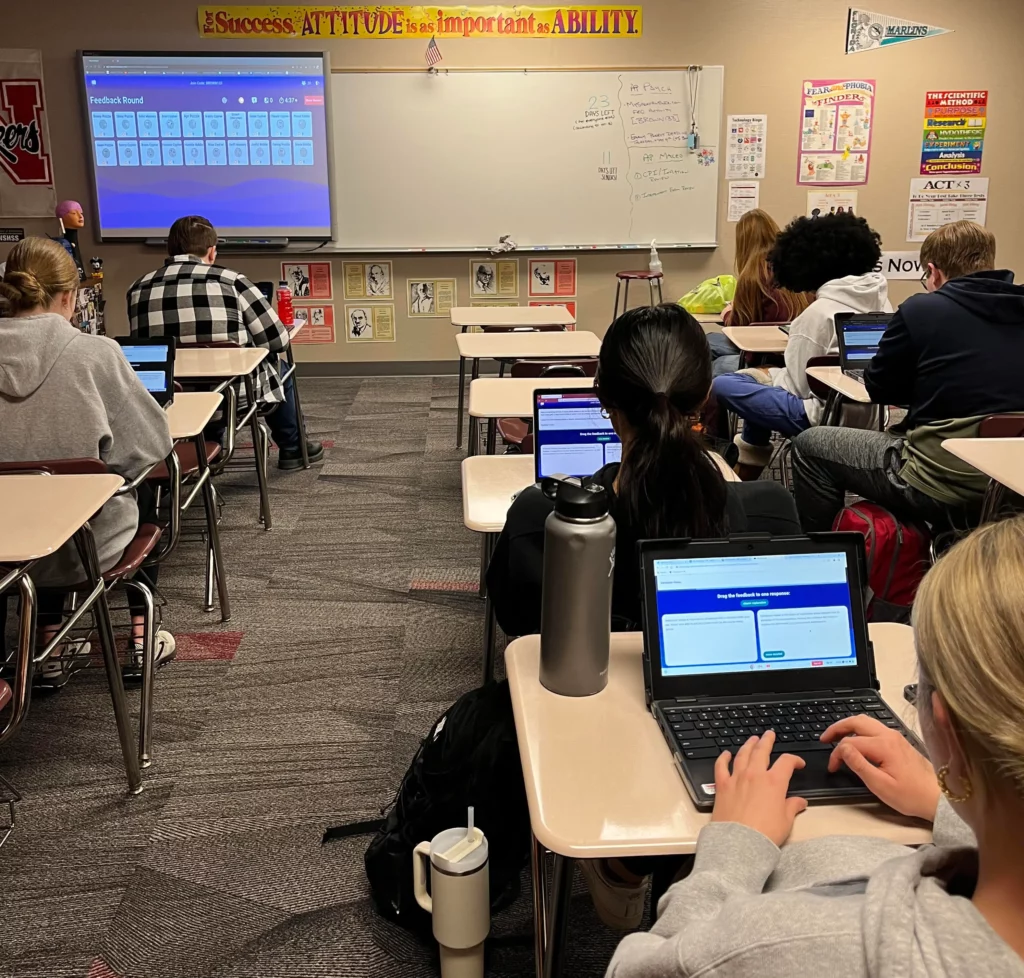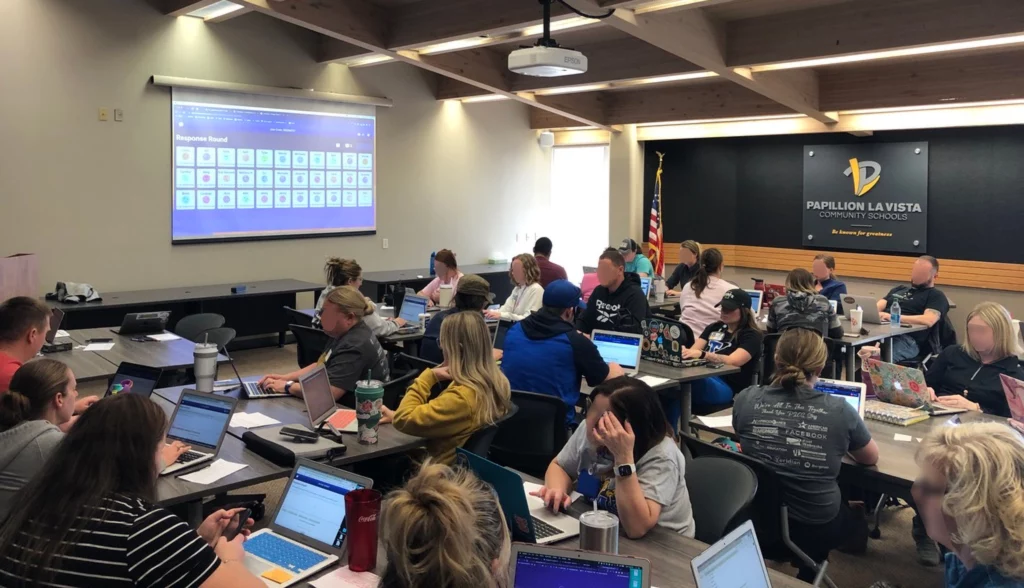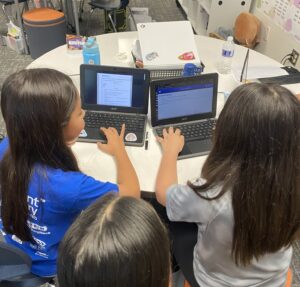Papillion La Vista Community Schools (PLCS) is a diverse educational community outside Omaha, Nebraska. As the fourth-largest school district in the state, PLCS serves approximately 11,600 students in 2 high schools, 3 middle schools, 16 elementary schools, and 2 learning academies. It is one of the most consistently innovative districts in the state, always seeking new ways to improve the quality of education.
In line with this mission, PLCS partnered with Short Answer in two professional development (PD) sessions. “We had led a PD session that included Short Answer and every single one of the teachers there said ‘I’m using that’,” said Gretchen Kalkowski, a professional learning facilitator at PLCS. “So we were like, you know what, let’s get them in here.” The two sessions with PLCS focused on improving feedback and formative assessment practices. They underlined the value and impact of Short Answer – both as a learning tool and a staff development service. This case study outlines that work with PLCS (to find out more about this work, please reach out here).
"We led a professional development session that included Short Answer and every single one of the teachers there said 'I'm using that'. So we were like, you know what, let's get them in here."
- Gretchen Kalkowski, Professional Learning Facilitator at PLCS

Session 1: Empowering the PLCS LEI Team
The first PD session involved Papillion La Vista’s 60-person Leaders Empowering Innovation (LEI) team. The LEI team is composed of teacher leaders from every building at PLCS, representing almost every age group and subject. This three-hour workshop focused on how to scaffold peer feedback to enhance K-12 formative assessment. The session demonstrated the application of Short Answer and other classroom activities in various educational contexts. “It was great that not only did you come and share this great tool, but you also explained feedback and the research and importance of it,” said Kalkowski. “The why behind it was very strong, which I think impacted teachers’ buy-in in such a positive way.”
Feedback from the LEI team was overwhelmingly positive. “I love that you can look at the different criteria and see which answers did well based on specific criteria. It allows kids to see that you can have a strong answer overall, but that might still be weak in specific areas,” said one LEI member. Many were impressed with the utility and ease of use of Short Answer and the broad applicability of the session, noting that they thought it would save them time in grading and allow them to focus on personalized instruction. Romie Brown, a high school social studies teacher at Papillion La Vista High School, implemented Short Answer in his AP Psychology class shortly after the LEI session. He said “My kids loved it! It really was a perfect way for them to review [for the AP Exam] given the style of the exam…In each round, we collected feedback on over 100 responses in only 3-4 minutes. Thanks so much for sharing this!”

Session 2: Deep Dive into the Research
The second session targeted a select group of middle and high school educators, delving deeper into the theoretical underpinnings of formative assessment and feedback. The session was grounded in Dr. Dylan Wiliam’s Embedded Formative Assessment (please note that Dr. Wiliam is on Short Answer’s advisory board) and The Effects of feedback interventions on Performance, an influential historical review of feedback research.
This session not only showcased the relevance and alignment of Short Answer with this educational research, but it also demonstrated practical ways to apply principles from this research in the classroom. Educators learned how to implement evidence-based strategies for improved learning outcomes – both using Short Answer and a variety of other pedagogical strategies. Jessica Heaton, a high school English teacher at PLCS’s Health Academy, said: “I plan on using Short Answer to ask students to give comparative feedback on short story analysis paragraphs.” Ms. Heaton went on to say, “Thank you for sharing really great resources and ideas…I appreciated that they were research-based and not just fun apps to try.”
"I got GREAT feedback on these PD sessions. Lots of our LEI members were raving about it back in their buildings."
- Jenna Krambek-Reeh, Instructional Technology Facilitator at PLCS
The Short Answer Impact
The partnership between PLCS and Short Answer was a fruitful one. “I got GREAT feedback on these PD sessions,” said Jenna Krambeck-Reeh, an instructional technology facilitator at PLCS and current president of the Nebraska Educational Technology Association. “Lots of LEI members were raving about it back in their buildings. I’m excited to continue to work with the Short Answer team as they continue to grow. I can’t recommend working with them enough.”
The work shows that Short Answer is much more than just a learning tool. As demonstrated by Papillion La Vista Community Schools, it can be an integral part of professional development initiatives, guiding teachers toward high-fidelity implementation of evidence-based strategies in their classrooms. “Feedback is something that is hard for teachers to have time to give, so I think there is so much power in students giving each other feedback,” said Kalkowski. “My wheels are still spinning on ways that we can use this going forward. I just think the possibilities are endless.”










